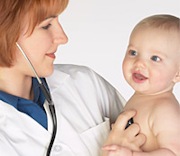Related terms: congenital heart defect, heart defects from birth
Congenital heart defects are heart problems present at birth. They happen when the heart does not develop normally before birth. About 1% of infants are born with one or more heart or circulatory problems.
Doctors usually do not know the cause of congenital heart defects, but they do know of some conditions that increase a child's risk of being born with a heart defect. They include
- Congenital heart disease in the baby's mother or father or brother or sister.
- Diabetes in the mother.
- German measles, toxoplasmosis (an infection that is passed through contact with cat feces), or HIV infection in the mother.
- The mother's use of alcohol during pregnancy.
- The mother's use of cocaine or other drugs during pregnancy.
- The mother's use of certain over-the-counter and prescription medicines during pregnancy.
Even if one or more of these conditions is present, it does not mean that the baby will be born with a heart defect. Also, babies can be born with heart defects even when none of these conditions are present. Rarely can families predict or prevent congenital heart defects. Of course, every pregnant woman needs to do all she can to ensure the health of her baby, like avoiding alcohol, drugs, and exposure to the German measles and environmental toxins.
Doctors can usually detect most heart defects while the child is still very young. Some children live with a defect for years before it is diagnosed. In some cases, doctors can spot congenital heart defects before the baby is even born. They cannot diagnose all defects before birth though, because the heart continues to develop in the days after the baby is born.
See also on this website: The Fetal Heart
Children with congenital heart defects may need to take antibiotic medicines before certain dental and surgical procedures. Taking antibiotics will protect against infective endocarditis. In addition, doctors will usually recommend medicines or surgery to treat the defect itself.
Types of congenital heart defects
Many different types of congenital heart defects are explained below. More than one defect may be present at the same time.
See also on this site: Cyanosis
See on other sites:
MedlinePlus
https://medlineplus.gov/congenitalheartdefects.html
Congenital Heart Defects
Texas Adult Congenital Heart Center (TACH)
www.bcm.edu/healthcare/care-centers/congenital-heart
This Baylor College of Medicine program enables patients with congenital heart disease to receive a seamless continuation of care from birth to old age.
Updated August 2016



